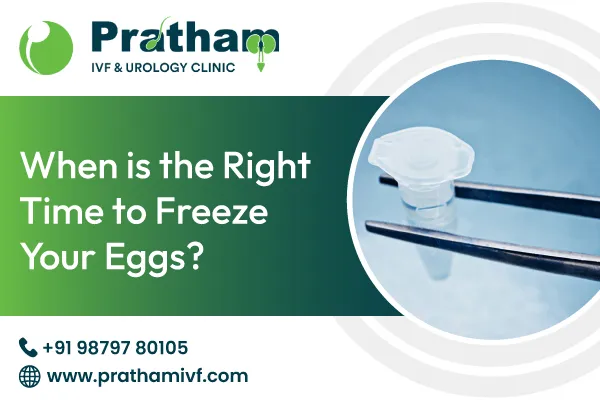
Egg freezing is a modern fertility option that allows women to preserve their eggs for future use, offering greater control over family planning. But the question many ask is: when is the right time? The ideal time to freeze your eggs is typically during your late 20s to early 30s, when egg quality and quantity are at their best. Women in their mid to late 30s can also benefit, but earlier preservation usually leads to higher success rates. Medical conditions like endometriosis, cancer treatments, or a family history of early menopause may also influence the timing.
Egg freezing empowers women to align personal, career, and medical goals without compromising fertility potential. The decision should always be personalized after consulting a fertility specialist who can evaluate your ovarian reserve and overall health. Acting at the right time ensures better outcomes and peace of mind for the future.
What is Egg Freezing? Procedure & Age Limit
Egg freezing, or oocyte cryopreservation, is a safe fertility preservation technique that allows women to store their healthy eggs for future pregnancy. In this process, eggs are retrieved, carefully frozen, and stored under advanced cryogenic conditions. Later, when desired, these eggs can be thawed, fertilized with sperm, and implanted into the uterus to achieve pregnancy. This option provides women greater control over family planning, especially when delaying parenthood due to personal, career, or medical reasons.
The Process of Egg Freezing
- Ovarian Stimulation – Hormone injections stimulate the ovaries to produce multiple mature eggs, increasing the chances of retrieving healthy eggs for successful freezing and future use.
- Egg Retrieval – A minimally invasive procedure collects mature eggs from the ovaries under medical supervision, ensuring safety, precision, and minimal discomfort for the patient during the process.
- Advanced Freezing – Eggs are preserved using modern vitrification techniques, which rapidly freeze them at sub-zero temperatures to maintain quality, viability, and long-term fertility potential for years to come.
Benefits of Egg Freezing
- Fertility Preservation – Egg freezing helps women safeguard fertility, ensuring they can plan families later without worrying about declining egg quality or age-related infertility risks.
- Flexibility for Goals – Offers women freedom to focus on education, career, or personal milestones while keeping motherhood as an option for the future.
- Medical Assurance – Provides hope for women facing medical conditions or treatments like chemotherapy that may otherwise reduce or damage fertility, giving them control over future parenthood.
Factors Influencing the Decision to Freeze Eggs
- Age and Fertility: Age is the single most critical factor. A woman’s fertility naturally declines after her early 30s, and egg quality decreases significantly after 35.
- Personal and Career Goals: Some women may wish to delay parenthood to focus on higher studies, career growth, or other life goals. Egg freezing offers flexibility.
- Health Considerations: Women with conditions like endometriosis, cancer, or a family history of premature ovarian failure may benefit from freezing eggs early.
Ideal Age for Egg Freezing
The ideal age for egg freezing is the late 20s to early 30s, when egg quality and quantity are highest. Preserving eggs earlier maximizes success rates, offering women greater reproductive choices and future family planning flexibility.
Recommended Age for Optimal Results
Medical experts often recommend freezing eggs between 25 and 35 years of age, when egg quality is highest.
Statistics on Success Rates by Age
- Women under 35 – Egg freezing offers the highest success rates in this age group, with greater chances of live birth due to excellent egg quality and higher ovarian reserve.
- Women 36–40 – Success rates gradually decline as egg quality reduces. However, freezing at this stage still provides significant benefits, offering future fertility options when natural conception becomes more difficult.
- Women over 40 – Success rates are much lower, as egg quality and quantity decline sharply. Still, egg freezing remains possible, though outcomes often depend on individual health and ovarian reserve.
Timing and Planning for Egg Freezing
- Before Major Medical Treatments – Women facing treatments like chemotherapy or radiation can freeze eggs in advance, protecting fertility and preserving the chance of parenthood after recovery from medical conditions.
- Late 20s to Early 30s – Freezing eggs during this period ensures the highest egg quality and quantity, giving women optimal success rates and greater flexibility for future family planning.
- Career or Personal Transitions – For women prioritizing education, career growth, or personal commitments, egg freezing provides reassurance, offering the option to delay parenthood without compromising future fertility potential.
Why Choose Pratham IVF Center?
When it comes to preserving fertility, choosing the right clinic is a life-changing decision. Pratham IVF Center stands out among leading egg freezing centres in Ahmedabad, offering advanced treatments with a compassionate, patient-focused approach. Our highly skilled fertility specialists recognize that every woman’s journey is unique, whether you are postponing parenthood for career goals, planning ahead of medical treatments, or seeking more control over your reproductive health. We specialize in egg freezing treatment in Ahmedabad using the latest technology to ensure safety, effectiveness, and long-term success. From the very first consultation, we provide complete transparency about the process, including the egg freezing cost, medical protocols, and expected outcomes. Our team is dedicated to creating a stress-free experience by combining expert medical care with emotional support at every step.
Recognized as one of the best IVF clinics in Ahmedabad, Pratham IVF has already helped countless women take confident steps toward future family planning. By choosing us, you gain access to world-class facilities, affordable treatment packages, and a trusted partner who values your dreams. With Pratham IVF Center, you can secure your fertility today and embrace tomorrow with confidence.
Conclusion
Egg freezing empowers women to take control of their fertility, but the decision requires careful consideration of age, health, finances, and emotional readiness. The best time to freeze eggs is usually before the mid-30s, though personal and medical circumstances vary. Pratham IVF Center provides advanced fertility care and personalized guidance for women considering egg freezing. With expert specialists, state-of-the-art technology, and compassionate support, we help you make informed decisions for your future. Contact us at +91 98797 80105, Email: prathamivf@gmail.com.
 Ahmedabad Top Rated IVF Center
Ahmedabad Top Rated IVF Center




